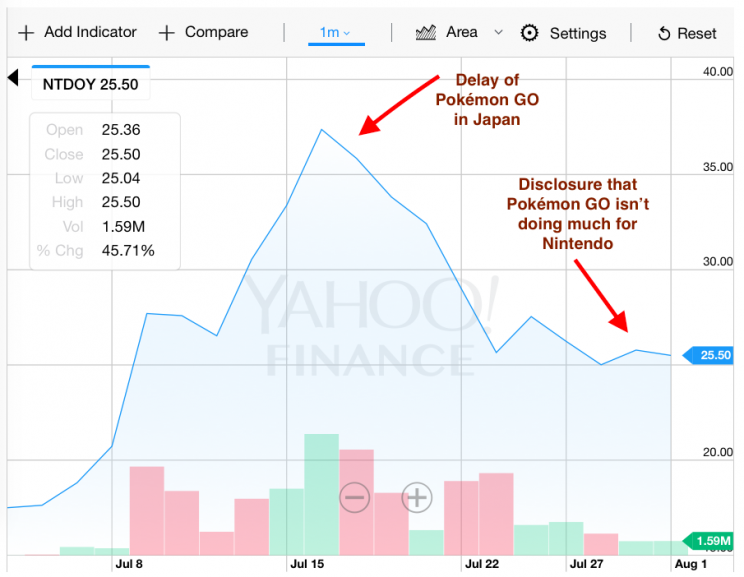How the market got Nintendo and Pokémon Go all wrong
In the 24 hours after the augmented-reality mobile game Pokémon GO launched on July 6, Nintendo saw its stock jump nearly 8% in the US, where the Japanese company’s shares trade as ADRs. The next day, shares jumped another 18%. Three days later, shares had jumped another 58%, up to nearly $28. Shares are now sitting at around $25. On July 15, Nintendo set a record for the most traded equity in a single day (by value of shares, not volume) on the Tokyo exchange.
The big boost that the game has brought to Nintendo’s stock (and market cap) became the biggest business narrative about the game and its impact.
But it never should have happened.
The market moved the stock largely based on a misconception that Nintendo was to thank for the game. (The stock market is so unpredictable right now that a Credit Suisse strategist says many clients are “totally lost.”) On July 19, the stock’s ride reversed after the launch of Pokémon GO in Japan was delayed; shares fell 13% in a day and continued to fall.
Last week, the fall continued when Nintendo disclosed in a note that the game has had minimal financial benefit to Nintendo, Tokyo shares dropped 18%, their largest hit since 1990, and US-listed shared dropped 11%. Such a tumble was arguably inevitable after the game’s viral success inflated the stock so much.

Pokémon GO is not really a Nintendo product. Nintendo did not make it; the company simply owns one-third of The Pokémon Company (32% of the voting power, to be precise) and has an undisclosed investment in Niantic, the mobile developer. (Google also has a stake in Niantic, but almost nobody is linking Pokémon GO to Google.) The Pokémon GO profit is split between The Pokémon Company, Niantic, Nintendo, and Apple and Android, the distributors of the game.
In fact, Nintendo was not the creator of the original Pokémon Red and Pokémon Blue games for Game Boy from the late 90s, either, it was merely the publisher. Those games were developed by Game Freak, another separate gaming company in which Nintendo has an ownership stake, but not a majority stake.
The Pokémon franchise is very different for Nintendo from characters like Mario or Zelda. The games involving those characters are games that Nintendo owns, develops and publishes.
Of course, those details don’t always matter to the market; investors treated Pokémon GO as an impetus to buy Nintendo stock.
That’s what Cleon Smith did after his son, startup marketing consultant Web Smith, told him about the frenzy over the game in the first few days after launch. “I made a fast move on it and bought a small block,” says Smith, who worked in cable television for companies like Time Warner and Cox and is now retired. “Now I wish I had bought a lot more. But I didn’t. Obviously, hindsight is 20/20. I was familiar with Pokémon because I got four millennial kids that loved it back in the day. But my son told me all about the augmented reality, and that was very interesting.” Smith is an example of the kind of casual investor who is buying Nintendo regardless of the details, and it’s not such a crazy move, considering that of all the many companies involved in the game, Nintendo is really the only public choice. (Even millennial stock-market newbies have been looking to buy Nintendo stock on the mobile app Robinhood, but can’t because the app is only for US-traded equities.)
This is thought to be the first time an augmented reality product has so strongly affected a public company’s stock. The closest other prominent example might be Facebook’s acquisition of VR headset maker Oculus Rift. When the company announced the purchase in May 2014, nothing much happened to Facebook’s stock (in fact, it continued a slide it had already been on), but in July, when it officially closed the deal, the stock popped and continued to rise. (The stock is up more than 70% since that time.) Of course, much of that rise has nothing to do with Oculus and is more based on Facebook’s success with selling ads, but analysts say Oculus has had at least some effect. “As time went on,” says Tom Forte, consumer trends analyst at Maxim Group, “I think it became clear that the Oculus deal would bear fruit. It was an indication that virtual reality has the potential to be a meaningful platform.”
To be sure, many Nintendo stockholders are in it for the long haul. Micah Stahl, a startup engineer in Boston, bought a batch of Nintendo shares back in 2012; it was his first stock investment at the time. “I felt like it was super under-appreciated,” he says. “I’m a huge Nintendo fan still, even through some of its tough times with hardware like the 3DS and Wii U not selling well. I knew that the price would eventually go back up due to some random game craze. Plus, Nintendo just has so many amazing creative assets—Mario, Zelda, Donkey Kong— it’s hard to put a price tag on that.” Stahl sold half his stock when the US-listed shares hit $34 on July 17, just one day before they hit a five-year high of $37 and then fell precipitously. He’s holding the rest.
The stock is down to $25.50 at the time of writing. Its all-time peak of $75 came in 2007 when the first Wii system was flying off shelves, and it looks unlikely it’ll touch that this year—at least not because of Pokémon GO.
—
Daniel Roberts is a writer at Yahoo Finance, covering sports business and technology. Follow him on Twitter at @readDanwrite.
Read more:
Pokémon GO is much bigger than Nintendo
Millennials are searching for Pokémon in the stock market

 Yahoo Finance
Yahoo Finance 